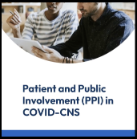Watch a short video explaining what PPI is, the benefits for research studies and learn more about the COVID-CNS PPI panel.
Click on the image below to view the video.
The National Institute for Health and Research defines patient and public involvement as:
"…public involvement in research as research being carried out ‘with’ or ‘by’ members of the public rather than ‘to’, ‘about’ or ‘for’ them. This includes, for example, working with research funders to prioritise research, offering advice as members of a project steering group, commenting on and developing research materials and undertaking interviews with research participants.
When we use the term ‘public’ we are including patients, potential patients, carers and people who use health and social care services as well as people from organisations that represent people who use services."
Patient and Public Involvement in research studies can offer a myriad of benefits. Some of those include:
- A different perspective from the rest of the research team
- Potential to improve the research quality and relevance
- Moral imperative, as research targeting populations or services, publicly funded
- Quality standards for research.
Examples of what the PPI panel might do:
- Attend PPI panel meetings for the duration of the study
- Provide a patient or public perspective on discussions
- Respond to written or verbal communications about the study between meetings
- Maintain the confidentiality of discussions and information relating to the study, meetings, and any related activity
- Report to the panel any studies or information which highlights patient-related issues that may inform the work of the group
- Explore and gather feedback from patients/families in respective organisations
- Feedback on study materials and information
- Disseminate study findings and any new materials/information for public policy and practice.
The COVID-CNS PPI panel
- Dr Ava Easton, CEO of the Encephalitis International and Chair of the COVID-CNS PPI Panel
- Professor Benedict Michael, Project co-lead, Senior Clinician Scientist Fellow at the University of Liverpool and Consultant Neurologist at The Walton Centre NHS Foundation Trust
- Professor Gerome Breen, Project co-lead, Professor of Psychiatric Genetics at the Institute of Psychiatry, Psychology and Neuroscience, King’s College London
- Richard Francis, Head of Research at the Stroke Association
- Georgina Carr, Chief Executive at the Neurological Alliance
- Dr Naomi Martin, Project Manager for COVID-CNS, King's College London
- Dr Greta Wood, Academic Clinical Fellow, University of Liverpool
- Monika Hartmann, Research Assistant, King's College London
- Patients on the panel include:
- Dr Lizzie Guise, a GP who experienced neurological problems and encephalitis following COVID-19
- Adam Sieradzki, a firefighter who experienced a stroke as a result of infection with COVID-19
- Penny Rowley, a carer who experienced a stroke as a result of infection with COVID-19
If you have any questions, are interested in the panel, or need more information please contact Dr Ava Easton, Chair of the Panel.
